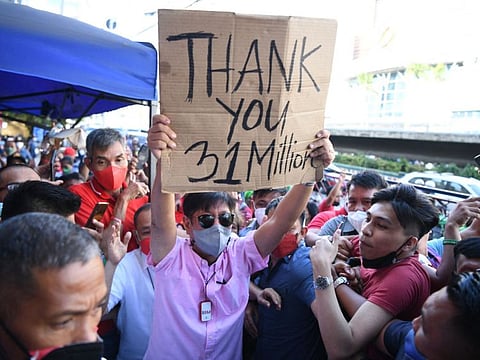Marcos Jr claims victory, to focus on economic team
Bongbong wants to look at appointing specialists for each government department

Manila: Philippine presumptive president Ferdinand “Bongbong” Marcos Jr. said he is looking to build up cabinet that will steer the economy by boosting jobs, managing food and fuel prices and pushing more infrastructure projects.
“The economic managers will be critical for the next several years because of the pandemic and the economic crisis. So that’s something that we are looking at very carefully,” Marcos Jr. said in his first appearance before the media after winning the election.
“I am also guided by the critical areas that we talked about during the campaign. So that’s what we are prioritising. Of course, it’s the economy, prices, it’s the price of energy, lack of jobs, education, infrastructure,” he added.
The former senator said he wants to keep his election campaign team as his advisers and look at appointing specialists for each government department. However, in a first step he said running mate Sara Duterte, who won the vice presidency by an even bigger margin, has agreed to helm the Education Department.
Marcos Jr. is poised to inherit an economy forecast to grow at one of the fastest rates in Southeast Asia this year, after the pandemic reduced household incomes as tourists stayed away and remittances from foreign labour dried up. Inflation is also surging at one of the fastest paces in Asia as food and fuel prices soar in the wake of Russia’s invasion of Ukraine.
The only son of the late dictator Ferdinand Marcos has cemented his family’s return to power more than three decades after his father was ousted from power. However, Marcos Jr. initially made his claim of victory through his spokesman Vic Rodriguez, signalling a little caution even as his supporters have held celebratory parties over the past two days.
“To the world, he says: judge me not by my ancestors, but by my actions,” Rodriguez was quoting Marcos Jr. during a televised briefing earlier on Wednesday.
Swearing on June 30
His lead in the presidential vote has become “unassailable,” Rodriguez said, adding that Marcos Jr. intends to be a leader for all citizens. The presumptive president will now work across the Philippines to address critical issues, his spokesman added.
The new president is expected to expected to be sworn in on June 30.
Marcos Jr.’s rival Leni Robredo didn’t concede, though she addressed her followers and prepared them for a prospect of a defeat in the early hours on Tuesday. She was hoping for a come-from-behind victory as she attracted some of the biggest pre-election rallies in decades and depended on volunteers to speak of her accomplishments.
Earlier in the day, Marcos Jr.’s team tweeted photos of him visiting his father’s tomb after he won the election and placing a wreath of flowers. The elder Marcos died in exile in 1989 but President Rodrigo Duterte defied a public outcry in 2016 to get the remains buried in the national heroes cemetery in Manila with full military honours.
The photos made the rounds in Marcos-related social media accounts. Marcos Jr.’s victory was helped by the prevalence of these handles on Facebook and Twitter that painted a favourable picture of his father’s dictatorship, calling it a “golden age.”
Marcos Jr. appealed for unity in his first media appearance while acknowledging that over 31 million people voted for him and there was some opposition to his win.
“I will continue for a government, an administration that gives voice to everyone who wants to help. We may not agree. We may not do exactly what they say. It is not important who the messenger is. The importance is going to be the message,” he said.
He and Sarah Duterte, the daughter of Rodrigo Duterte, campaigned on a platform of national unity without saying how they would heal the wounds that have festered since their fathers’ presidencies.
Sign up for the Daily Briefing
Get the latest news and updates straight to your inbox



